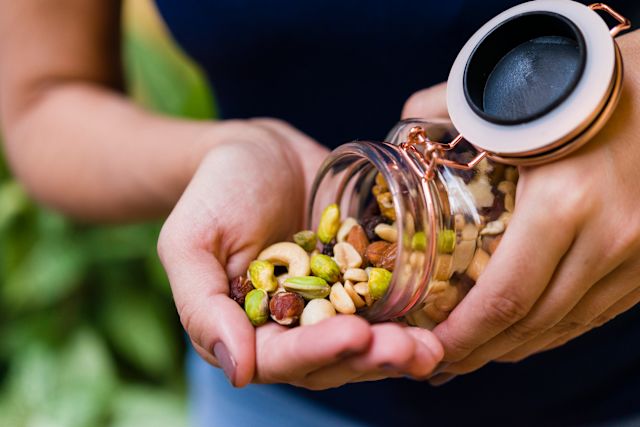Updated on April 28, 2025.
Nuts aren’t just an easy grab-and-go snack. They’re good sources of plant-based protein, fiber, healthy fats, minerals, and vitamins. Among other benefits, nuts can protect and preserve your health by lessening inflammation, strengthening blood vessels, and helping your body use insulin. Research has also tied regular consumption of nuts to a lower risk of heart disease and stroke.
Most nuts can be eaten roasted or raw. At the grocery store, look for products with no added sugar or salt. If you consume nut butters or nut milks, check the labels for added ingredients and nutrition content. While nuts are rich in many beneficial nutrients, it’s wise to stick to one serving each day, since they are calorie-dense. This typically translates to small handful.
With that in mind, here’s what to know about the health benefits of a variety of common nuts, from A (almonds) to W (walnuts).
Almonds
The most commonly consumed tree nut in the United States, almonds are high in vitamin E, folic acid, calcium, and magnesium. One serving (1 ounce of almonds) is about 23 almonds, or 1/4 cup.
Try almonds sprinkled on salads, as part of your morning oatmeal, or in different forms; you can enjoy them as almond milk or creamer, almond butter, and almond flour.
Brazil nuts
Brazil nuts are bigger than most other snacking nuts, each about the size of an eraser. Due to their larger size, one serving is about six nuts. Though less common in the U.S. than in other parts of the world, they can often be found in popular nut mixes.
Just one serving of Brazil nuts to meet your body's daily need for selenium, an antioxidant mineral. Antioxidants help protect your cells from damage and may help lower your risk for disease. Brazil nuts also provide essential amino acids, which help your body make proteins for growth, tissue repair, and other critical functions.
Cashews
Cashews are a good source of copper and magnesium. Copper helps your body make energy, body tissue, and blood vessels, and it also supports your nervous and immune systems. The magnesium in cashews helps support heart, bone, nerve, and muscle health.
A serving of cashews is about 18 nuts. Since they tend to be softer than other nuts, vegans (people who don’t eat animal products) often use cashews as a stand-in for dairy items and meats. Cashew butter is also a popular alternative to peanut butter.
Hazelnuts
Also known as filberts, these slightly smoky-flavored nuts are packed with tryptophan, an essential amino acid that contributes to healthy blood vessels and mood regulation. One serving of hazelnuts is about 21 nuts.
Macadamia nuts
Consuming monounsaturated fats can help to reduce your levels of low-density lipoprotein cholesterol (LDL or “bad” cholesterol), which lowers the risk of heart problems. While most nuts are considered to be good sources, macadamia nuts are particularly rich. Just 1 ounce (10 to 12 nuts) has about 17 grams of these heart-healthy fats.
As with cashews, these subtly flavored, buttery nuts are high in magnesium, which helps to support many key body functions.
Pistachios
A single serving of pistachios has more potassium than half a banana. If you’re aiming to maintain a healthy blood pressure, foods high in potassium—like pistachios—may help. Like many other nuts, the components in pistachios may also support healthy blood vessels and cholesterol levels.
A 1-ounce serving of pistachios works out to about 49 nuts. Sprinkle them on salads, fish, chicken, or avocado toast, or try them in a variety of baked goods.
Peanuts
Peanuts aren't technically nuts, but legumes, or cousins to peas, lentils, and beans. Among other benefits, they’re rich in three key B vitamins—folate, niacin, and riboflavin—that help to keep blood cells and DNA healthy, maintain energy, and support a healthy pregnancy.
Peanuts are also a good source of plant-based protein. They contain around 7 grams per ounce—about as much as beef.
Walnuts
Walnuts are an excellent source of heart-healthy omega-3 fatty acids—and especially rich in essential alpha-linolenic acid (ALA). A greater intake of ALA is linked to a lower risk for developing and dying from heart disease. About 14 walnut halves (or a 1-ounce serving) provide 2.5 grams of ALA.
Walnuts are also packed with antioxidants, such as vitamin E. Studies have consistently ranked them at the top among nuts in antioxidant content.







